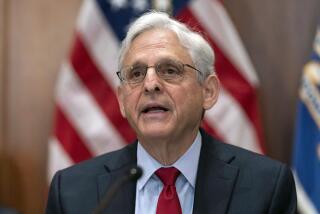Congress Testimony of Ex-Justice Aide Will Be Probed
- Share via
WASHINGTON — A special federal court named an independent counsel Thursday to investigate whether former Assistant Atty. Gen. Theodore B. Olson gave deliberately false or misleading testimony to Congress in 1983 about documents sought in a controversy over the Environmental Protection Agency’s handling of Superfund toxic waste cleanup.
The three-judge panel named a veteran Washington attorney, James C. McKay, to conduct the investigation of Olson, now partner-in-charge of the office here of the Los Angeles law firm of Gibson, Dunn & Crutcher.
In outlining the inquiry, the judges adopted the recommendation of Atty. Gen. Edwin Meese III for a much narrower probe than that proposed last December by the House Judiciary Committee, which called for investigating several other Justice Department officials as well as Deputy White House Counsel Richard A. Hauser for their handling of the EPA inquiries.
Ethics Act Cited
Hauser was found not to be covered by the Ethics in Government Act’s provisions for an independent counsel inquiry, according to Terry Eastland, the Justice Department’s chief spokesman.
Nevertheless, the department’s criminal division reviewed Hauser’s certification that he had read EPA documents before they were withheld from Congress under executive privilege, a certification that was challenged by the House Judiciary Committee, Eastland said. It found no wrongdoing.
Allegations against former Deputy Atty. Gen. Edward C. Schmults and former Deputy Atty. Gen. Carol E. Dinkins were dropped because of lack of evidence of criminal intent in their actions in the EPA case, Meese said in a report to the special court that was released Thursday.
Behind the allegations was a dispute between the executive and legislative branches over attempts by two House subcommittees to exercise oversight authority over EPA’s controversial handling of the hazardous waste Superfund. The fight led to a contempt citation of former EPA Administrator Anne McGill Burford over withholding “enforcement sensitive” documents and a Justice Department suit against the House.
Olson became centrally involved in the dispute through his position as assistant attorney general in charge of the Justice Department’s office of legal counsel, a post known as “the attorney general’s lawyer” for its role in providing legal advice to the nation’s chief law enforcement officer.
The Judiciary Committee report accused Olson of giving false and misleading testimony in a March 10, 1983, appearance before the judiciary subcommittee on monopolies and commercial law.
Olson testified that while his office had not provided the judiciary subcommittee with handwritten notes and “scraps of paper” in response to the panel’s request for EPA documents, it had turned over everything “finalized” that was “relevant to the questions that you have asked and to the formal advice that we have given.”
But Meese’s recommendation to the special court noted that “in fact, the office of legal counsel had not provided the committee with at least five apparently final and relevant documents that appear to embody ‘formal advice’ by” Olson’s office.
The recommendation also cited Olson’s testimony that he did not recall being told by anyone associated with the EPA that the agency was willing to turn over the disputed documents to the subcommittees.
“There is evidence that Mr. Olson may have been aware of statements that EPA was willing to turn over the documents, and that he may have been told as much by EPA officials,” said Meese’s recommendation, which was based on a preliminary inquiry conducted by Justice Department lawyers and FBI agents.
Meese requested the appointment of an independent counsel to investigate whether Olson’s testimony violated federal laws against knowingly making false statements to an official inquiry or obstructing proceedings.
Olson, in an interview, reiterated his denial “as strongly as I can” that he had ever misled Congress.
McKay, 69, a partner 29 years in the Washington law firm of Covington & Burling, is a registered Democrat, according to the court’s announcement of his appointment. But McKay said in an interview that he had voted for candidates of both major parties and that he has not been active in politics.
More to Read
Get the L.A. Times Politics newsletter
Deeply reported insights into legislation, politics and policy from Sacramento, Washington and beyond. In your inbox twice per week.
You may occasionally receive promotional content from the Los Angeles Times.










